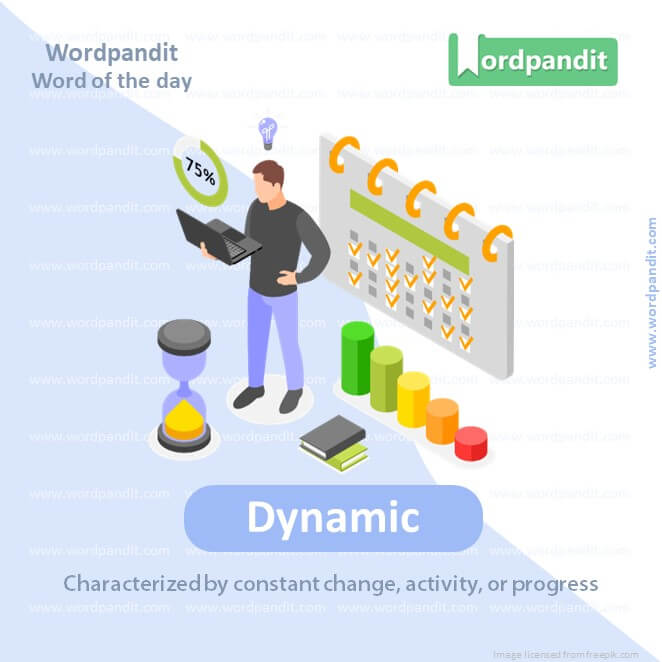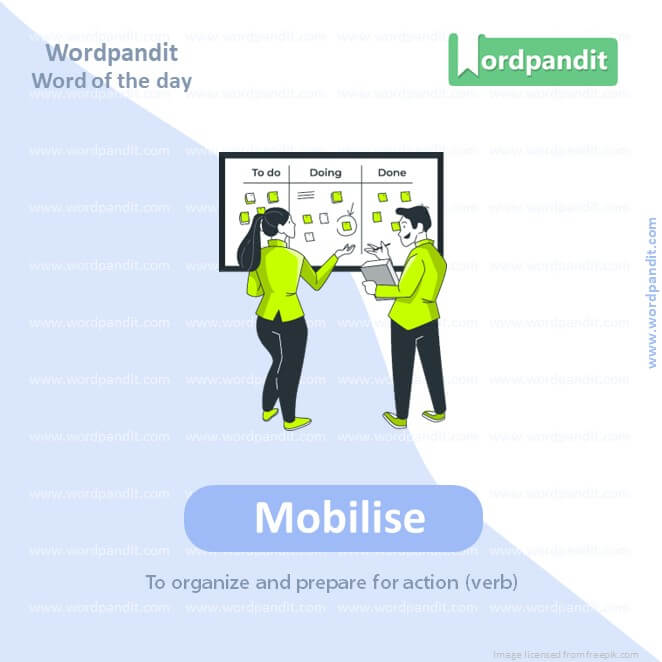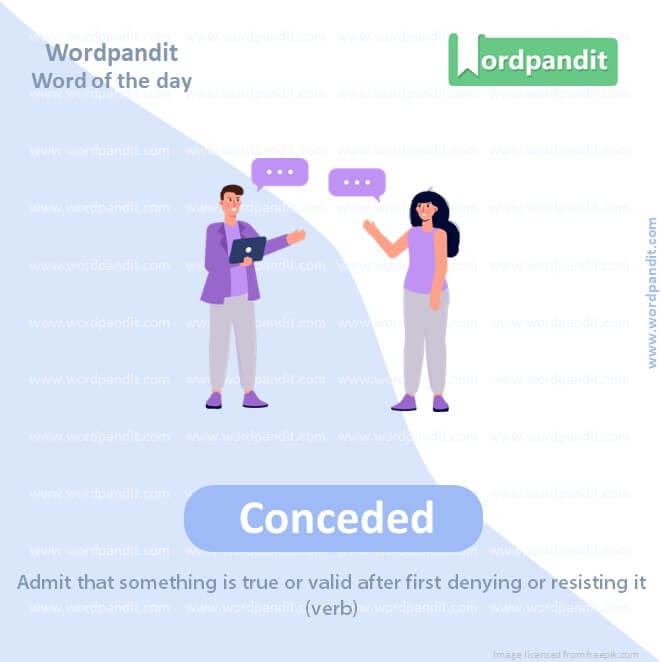Daily Vocabulary Words: List of Daily Used Words
Hi there. Welcome to this special section @ Wordpandit.
Our endeavour here is straightforward: highlighting important daily vocabulary words, you would encounter in The Hindu. This is your repository of commonly used words; essentially, we are posting a list of daily used words. Hence, this has significant practical application as it teaches you words that are commonly used in a leading publication such as The Hindu.
Visit the website daily to learn words from The Hindu.

WORD-1: Alliance
CONTEXT: CPI general secretary D. Raja speaks to The Hindu on the internal dynamics in the Indian National Developmental, Inclusive Alliance (INDIA) bloc, and the Left parties’ position within the alliance.
SOURCE: The Hindu
EXPLANATORY PARAGRAPH: Imagine you and your friends decide to team up to build a big sandcastle together. That’s what an “alliance” is. It’s when people or groups join together because they have the same goal or want to help each other out.
MEANING: A union or association formed for mutual benefit, especially between countries or organizations (noun).
PRONUNCIATION: uh-LY-uhns
SYNONYMS: coalition, union, partnership, league, consortium
USAGE EXAMPLE:
1. The countries formed an alliance to promote trade and peace.
2. They entered into a strategic alliance to improve their market position.
3. The alliance between the two companies proved beneficial for both.
4. The political parties formed an alliance for the upcoming elections.

WORD-2: Dynamic
CONTEXT: CPI general secretary D. Raja speaks to The Hindu on the internal dynamics in the Indian National Developmental, Inclusive Alliance (INDIA) bloc, and the Left parties’ position within the alliance.
SOURCE: The Hindu
EXPLANATORY PARAGRAPH: Imagine a superhero who can change powers depending on what is needed, like being super fast to catch a bad guy or strong to lift a car. “Dynamic” describes something that is always changing and active, just like the superhero’s powers.
MEANING: Characterized by constant change, activity, or progress (adjective).
PRONUNCIATION: dy-NAM-ik
SYNONYMS: energetic, active, vibrant, changing, forceful
USAGE EXAMPLE:
1. She brings a dynamic energy to the team.
2. The dynamic market requires companies to continually adapt.
3. He admired her dynamic approach to problem-solving.
4. The workshop was dynamic and engaging.
WORD-3: Barely
CONTEXT: There is barely any time left for the 2024 General Election, but the INDIA bloc hasn’t had a single public meeting, and hasn’t finalised a seat sharing formula. Is it too late?
SOURCE: The Hindu
EXPLANATORY PARAGRAPH: Imagine you’re in a race, and you reach the finish line just a second before time runs out. “Barely” is used to describe when something just, just happens by the smallest amount.
MEANING: Only just; almost not (adverb).
PRONUNCIATION: BARE-lee
SYNONYMS: scarcely, hardly, just, narrowly, only just
USAGE EXAMPLE:
1. He barely made it to the bus on time.
2. There was barely enough food for everyone.
3. She barely passed the final exam.
4. He could barely see the path in the dark.
WORD-4: Varies
CONTEXT: The political situation varies from State to State. For example, in Tamil Nadu, one does not foresee many problems, even though there are speculations that the Congress may ask for more seats than they fought in 2019.
SOURCE: The Hindu
EXPLANATORY PARAGRAPH: Imagine you have a box of crayons, and each crayon is a different color. The colors change as you pick each crayon. “Varies” means to change or be different in different situations or at different times.
MEANING: Differs, changes, or alters (verb).
PRONUNCIATION: VAIR-eez
SYNONYMS: changes, differs, fluctuates, alters, shifts
USAGE EXAMPLE:
1. The temperature varies throughout the year.
2. The menu at the café varies each week.
3. Her mood varies from happy to sad very quickly.
4. The quality of the product varies depending on the manufacturer.
WORD-5: Foresee
CONTEXT: The political situation varies from State to State. For example, in Tamil Nadu, one does not foresee many problems, even though there are speculations that the Congress may ask for more seats than they fought in 2019.
SOURCE: The Hindu
EXPLANATORY PARAGRAPH: Imagine you have a magic ball that shows you what’s going to happen tomorrow. You can see ahead of time if it’s going to rain or be sunny. “Foresee” is just like that, but instead of a magic ball, it’s using your mind to predict what might happen in the future.
MEANING: To know or predict what will happen in the future (verb).
PRONUNCIATION: for-SEE
SYNONYMS: predict, anticipate, expect, envision, project
USAGE EXAMPLE:
1. She foresaw the problems that would come with the new project.
2. It was difficult to foresee the outcome of the election.
3. The company foresaw increased demand and hired more staff.
4. He did not foresee the complications that would arise.
WORD-6: Speculations
CONTEXT: The political situation varies from State to State. For example, in Tamil Nadu, one does not foresee many problems, even though there are speculations that the Congress may ask for more seats than they fought in 2019.
SOURCE: The Hindu
EXPLANATORY PARAGRAPH: Imagine you’re guessing who took the last cookie from the jar without seeing them. You might think of different people who could have done it. “Speculations” are guesses or ideas about something that might be true but are not sure yet.
MEANING: The forming of theories or conjectures without firm evidence (noun).
PRONUNCIATION: spek-yuh-LAY-shuhnz
SYNONYMS: conjectures, guesses, theories, hypothesizes, assumptions
USAGE EXAMPLE:
1. There are many speculations about the new technology’s potential.
2. The book is full of speculations about the future of the world.
3. Speculations arose about the reasons for his sudden resignation.
4. Investors are making speculations on the stock market’s direction.

WORD-7: Mobilise
CONTEXT: I agree that time is short. We will have to put our heads together to organise everything and mobilise people.
SOURCE: The Hindu
EXPLANATORY PARAGRAPH: Imagine everyone in your neighborhood decides to clean up the park. To start, you need to get everyone together and ready with tools and gloves. “Mobilise” means to organize and prepare for action.
MEANING: To organize and prepare for action (verb).
PRONUNCIATION: MO-buh-lyze
SYNONYMS: deploy, muster, rally, activate, assemble
USAGE EXAMPLE:
1. The government mobilised the army in response to the crisis.
2. Community leaders mobilised volunteers to help after the flood.
3. They mobilised support for the new policy.
4. Efforts were mobilised at an international level.

WORD-8: Accommodate
CONTEXT: If they don’t accommodate Left parties properly, then Left parties can’t keep away from electoral battles.
SOURCE: The Hindu
EXPLANATORY PARAGRAPH: Imagine your friend comes over to play, but they don’t have a chair to sit on. So, you grab an extra chair from another room so they can sit comfortably. “Accommodate” means to make room for someone or adjust to help them out.
MEANING: To provide room for someone or adjust to fit their needs (verb).
PRONUNCIATION: uh-KOM-uh-date
SYNONYMS: adapt, adjust, cater to, make room for, serve
USAGE EXAMPLE:
1. The hotel can accommodate up to 500 guests.
2. The teacher tried to accommodate all learning styles in her lessons.
3. They made changes to accommodate the new laws.
4. The program was designed to accommodate different age groups.

WORD-9: Conceded
CONTEXT: Telangana is the only State out of the five that went for Assembly elections recently where the Congress conceded seats for an ally. Are there any lessons there?
SOURCE: The Hindu
EXPLANATORY PARAGRAPH: Imagine you and a friend are arguing about who’s the fastest runner. After racing, your friend wins, and you admit they’re faster. “Conceded” means you accept something is true after first disagreeing or resisting it.
MEANING: Admit that something is true or valid after first denying or resisting it (verb)
PRONUNCIATION: kuhn-SEED-ed
SYNONYMS: admit, acknowledge, grant, allow, accept
USAGE EXAMPLE:
1. He finally conceded that she was right.
2. The politician conceded defeat after the election results were announced.
3. After a long discussion, she conceded that the plan might not work.
4. The company conceded that there were flaws in their product.
WORD-10: Negotiations
CONTEXT: The seat sharing negotiations have to begin at the State-level and we must conclude it at the earliest.
SOURCE: The Hindu
EXPLANATORY PARAGRAPH: Imagine you want to trade sandwiches with your friend because you like theirs more. You both talk about it and try to decide if it’s a good idea. “Negotiations” are when people discuss something to reach an agreement that everyone is happy with.
MEANING: Discussions aimed at reaching an agreement (noun).
PRONUNCIATION: nuh-go-shee-AY-shuhnz
SYNONYMS: talks, discussions, deliberations, dialogues, bargaining
USAGE EXAMPLE:
1. The negotiations between the companies lasted for weeks.
2. Diplomats are involved in peace negotiations.
3. Wage negotiations are scheduled for next month.
4. Successful negotiations require good communication skills.
Vocabulary PDF
In the digital age, the way we learn languages has transformed dramatically. Among the myriad of resources at our disposal, a ‘vocabulary PDF’ serves as an incredibly effective tool. It offers a structured, accessible and convenient method of enhancing our language skills. To maximize the potential of ‘vocabulary PDF’, it is crucial to understand how to make the most of it.
First off, when venturing through the process of learning with a ‘vocabulary PDF’, maintaining consistent learner engagement is pivotal. This involves regular revision sessions where you consistently go back and refresh your memory about previously learned words. This cyclic process is particularly effective in promoting long-term retention of the vocabulary.
While leveraging a ‘vocabulary PDF’, it’s also beneficial to annotate as you progress. Annotation brings an interactive aspect to your learning, making it dynamic and personalized. Make notes of context, synonyms, antonyms, or even create sentences using the new words. This engagement with the ‘vocabulary PDF’ aids in imbibing the meaning and usage of the words.
Another strategic approach to mastering a ‘vocabulary PDF’ is to utilize a reading aloud technique. Listening to the words as you speak them out loud can stimulate auditory learning, enhancing your pronunciation and comprehension of the vocabulary.
When using a ‘vocabulary PDF’, it is also advantageous to supplement your learning through applications of the new words. Write an essay, engage in a conversation, or post on social media using the new words. This reinforces the acquired vocabulary, augmenting your grasp over them.
In conclusion, a ‘vocabulary PDF’ is a potent instrument that, when harnessed effectively, can significantly bolster your language learning journey. It requires a blend of consistent revision, active annotation, auditory engagement, and practical application. With these strategies in hand, mastering ‘vocabulary PDF’ can be a rewarding and successful experience that fuels your linguistic endeavors.













